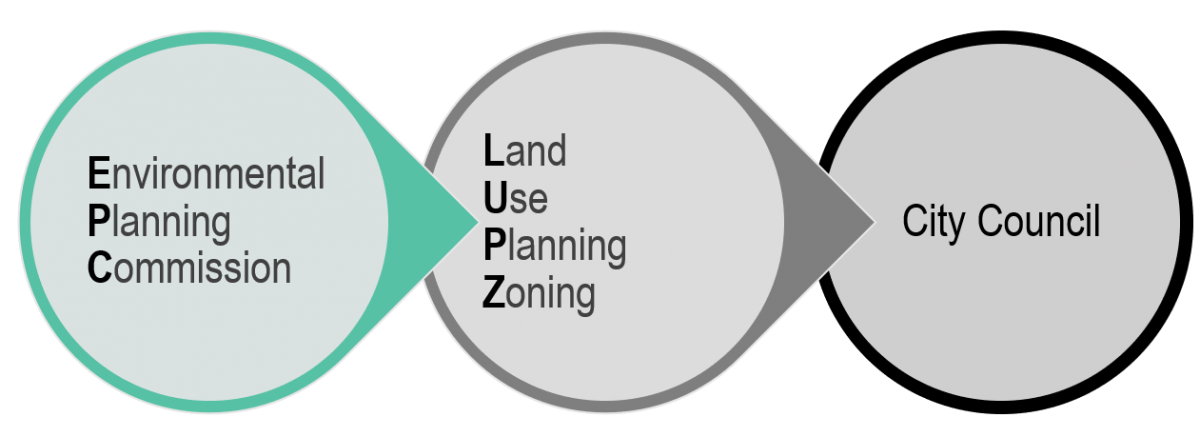The City has committed to continually improving the Integrated Development Ordinance (IDO) through a biennial update process.
Hearings
The review/decision process has three steps:

Hearing #1
The Environmental Planning Commission (EPC) makes a recommendation to City Council, which makes the final decision on citywide and small area amendments.
EPC typically hears proposed changes at a special hearing the week before its regularly scheduled hearings (3rd Thursdays of each month). Planning staff will give a presentation explaining proposed changes, and EPC will take public comment.
- EPC meeting materials (staff reports, notices of decision, and written comments)
- Citywide changes (often provided as a table) will be considered as 1 case
- Small area changes (often provided as a redline) will be considered as a separate case for each geography
- EPC hearings are conducted via Zoom until further notice
- See agenda posted in meeting materials for Zoom details
- Neighborhood association representatives typically have 5 minutes to give verbal comments
- Individuals typically have 2 minutes to give verbal comments
Hearing #2 (or more)
EPC may vote to continue any of the IDO annual update cases to additional hearings, either its regularly scheduled hearings or another special hearing.
Planning staff will give a presentation explaining proposed conditions of approval or any other changes since the first hearing, and EPC will take public comment. Because the case has been continued, all comments from the first hearing are still part of the record, so EPC will often remind commenters to refrain from repeating the comments they made at the first hearing.
- EPC meeting materials (staff reports, notices of decision, and written comments)
LUPZ
Planning staff transmits the Annual Update to the City Council for review. City Council introduces adopting ordinances and refers them to the Council's Land Use, Planning, and Zoning (LUPZ) Committee for recommendation.
LUPZ will hear the proposed changes at its regularly scheduled hearings, typically the 2nd Wednesday of each month, which are hybrid (in-person in the Committee Hearing Room on the 9th Floor of City Hall and via Zoom).
Council staff will give a presentation, and LUPZ will take public comments.
- See Legistar's legislation tab for proposed legislation and meeting materials.
- See Legistar's calendar tab for the agenda, including Zoom details and instructions for verbal comments.
- Commenters usually have 2 minutes to make comments.
LUPZ can amend proposed changes (including adding or deleting) via Committee Amendments. LUPZ can continue the hearing to subsequent hearing dates. Ultimately, LUPZ can vote to recommend "Do Pass," "Do Not Pass," or to send the proposed changes to the full City Council with no recommendation.
Full City Council
The full City Council will typically hear proposed changes at the next Council meeting, which are hybrid (in-person in the Vicent E. Griego Chambers in City Hall and via Zoom).
Council staff will make a presentation, and Council will take public comments on each bill.
- See Legistar's legislation tab for meeting materials.
- See Legistar's calendar tab for agenda, including Zoom details, and instructions for verbal comment.
- Commenters typically have 2 minutes to make comments.
Small Area Amendments
Small area amendments are reviewed/decided as a quasi-judicial matter, meaning City Councilors will be acting as judges rather than as legislators. For that reason, the public may not speak to Councilors directly outside of a hearing about these proposed small area amendments.
- See Table 6-1-1 and Subsection 14-16-6-7(E) for Amendment to IDO Text - Small Area
Small area amendments can be to Overlay zones (i.e. a collection of small area rules in a specific geographic area).
- Airport Protection Overlay (APO) zones
- Character Protection Overlay (CPO) zones
- Historic Protection Overlay (HPO) zones
- View Protection Overlay (VPO) zones
Small area amendments can be to regulations in several Parts of the IDO:
Citywide Changes
Citywide text amendments are reviewed/decided as a legislative manner, meaning City Councilors will be acting as legislators rather than as judges making a determination about a specific property or combination of properties in a small area. For that reason, the public may speak to Councilors directly outside of hearings about these proposed citywide amendments.
- See Table 6-1-1 and Subsection 14-16-6-7(D) for Amendment to IDO Text - Citywide
Citywide text amendments can be made in any Part of the IDO, as long as the change is not related to a specific small area (i.e. Overlay zone or small area regulation).
Examples of a citywide text amendment:
- Change in Part 2 related to a particular zone district
- Change in Part 4 related to a particular land use when it's next to residential development
- Change in Part 5 related to a particular development standard in all Areas of Change or in Premium Transit areas
- Change in Part 6 related to what public notice is required for Site Plan applications reviewed by City staff administratively
Pre-EPC Submittal Public Review Meetings
Planning staff hosts meetings in September to discuss proposed citywide changes before submitting to the EPC for a hearing in December.
These meetings review changes that staff has gathered, and staff takes comments and other suggestions to consider for submittal to the EPC.
Pre-EPC Hearing Public Review Meeting
Planning staff hosts review meetings in November before to the first EPC Hearing, which is often scheduled for a special hearing in December.
These meetings review the proposed changes submitted to the City's review and decision process and explain how to make comments to decision-makers throughoiut the process, either as written comments or verbally at public hearings.
Public Information Meeting
Planning staff or Council services staff may host public meetings throughout the review/decision process to help explain proposed changes and/or the process itself. At these meetings, the public is encouraged to make comments to decision-makers either as written comments or verbally at public hearings.
The City has updated the IDO each year since it was adopted in 2017 and went into effect on May 17, 2018. As of 2023, the City will update the IDO every other year in odd years. The next update will be in 2025.
Development approved under each version of the IDO is held to the regulations that were in place when the application was accepted as complete and began the City's review/decision process for each development project. For that reason, the City keeps an archive of IDO documents effective in each year.
- 2023 Annual Update
- Past IDO annual updates
- See Planning webpage for the full legislative history of the IDO.
Planning staff incorporates adopted changes into the following documents:
- an archive draft, which notes changes from the previous year with footnotes and with the colored text:
- red for citywide EPC changes.
- green for citywide Council changes.
- blue for small area changes
- the effective document, which includes a summary table of amendments over time, which is posted:
- on this interactive IDO website.
- on the Planning webpage.
- on the City's Amlegal website.
